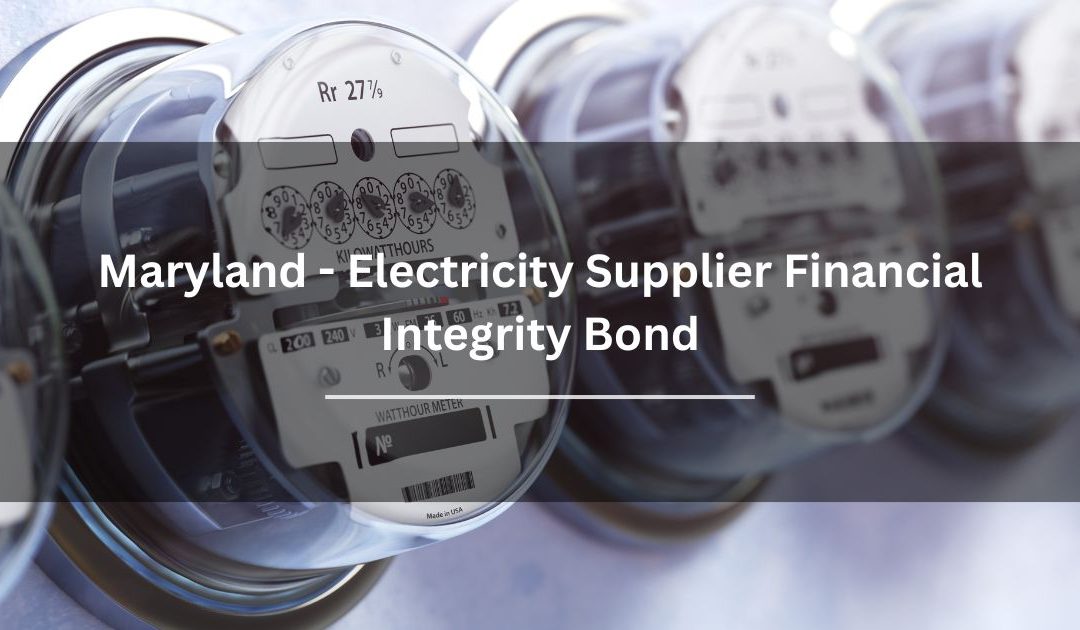Get an Instant Quote on Electricity Supplier Financial Integrity Bond
Introduction
From our perspective, electricity suppliers in Maryland play a critical role in providing reliable energy services to consumers. To maintain industry standards and protect public interests, electricity suppliers are required to secure a Maryland - Electricity Supplier Financial Integrity ($250,000) Bond. This bond guarantees that suppliers fulfill their financial obligations and comply with Maryland’s regulatory framework.
Similar to the Maryland - Gas Supplier Financial Integrity ($250,000) Bond, which ensures compliance among gas suppliers, this bond protects consumers and regulators by holding electricity suppliers accountable for their financial responsibilities. By obtaining this bond, suppliers demonstrate their commitment to meeting regulatory standards and maintaining financial stability.

Common Misunderstandings About Electricity Supplier Bonds
We’ve noticed that many electricity suppliers misunderstand the purpose and requirements of the Maryland - Electricity Supplier Financial Integrity ($250,000) Bond. Some mistakenly assume that securing the bond is a one-time obligation, unaware that the bond must be maintained and renewed periodically to ensure continuous compliance. Others believe the bond functions as a form of business insurance, covering operational losses, which is inaccurate.
Similar confusion arises with the IBEW Local No. 26 - Wage and Welfare ($50,000) Bond, where contractors may assume that obtaining the bond fulfills all their obligations to union workers, overlooking the need for ongoing compliance. These misconceptions can lead to regulatory violations, financial penalties, and reputational harm if not addressed properly.
Swiftbonds: Guiding Electricity Suppliers Through Bond Compliance
Based on our experience, Swiftbonds offers expert assistance to electricity suppliers seeking to obtain a Maryland - Electricity Supplier Financial Integrity ($250,000) Bond. With in-depth knowledge of Maryland’s regulatory environment, Swiftbonds simplifies the bonding process and ensures that suppliers meet all compliance requirements.
Swiftbonds also provides guidance on obtaining other bonds, such as the IBEW Local No. 26 - Wage and Welfare ($50,000) Bond and the Maryland - Gas Supplier Financial Integrity ($250,000) Bond, helping clients across multiple sectors protect public interests and fulfill their regulatory obligations.

Steps to Obtain a Maryland - Electricity Supplier Financial Integrity Bond
What we’ve discovered is that securing a Maryland - Electricity Supplier Financial Integrity ($250,000) Bond involves a straightforward process designed to protect consumers and uphold regulatory standards. The steps include:
-
Confirm Bond Requirements – Verify the bond amount and specific requirements set by the Maryland Public Service Commission (PSC).
-
Submit a Bond Application – Provide detailed information about the supplier’s business, including operational history and financial standing.
-
Receive a Bond Quote – Swiftbonds reviews the application and provides a competitive bond quote tailored to the supplier’s profile.
-
Pay the Bond Premium – The supplier pays the bond premium to activate the bond and secure compliance.
-
File the Bond with the PSC – Submit the bond to the Maryland Public Service Commission to satisfy licensing requirements.
-
Renew and Maintain the Bond – Monitor bond expiration dates and renew the bond as needed to avoid compliance lapses.
Swiftbonds manages this process seamlessly, ensuring that electricity suppliers meet their regulatory obligations efficiently.
Risks of Operating Without a Valid Bond
In our observation, operating without a valid Maryland - Electricity Supplier Financial Integrity ($250,000) Bond can lead to serious consequences for electricity suppliers. Suppliers who fail to maintain their bond risk license suspension, hefty fines, and potential lawsuits. Additionally, non-compliance can erode public trust and damage the supplier’s reputation.
Similar risks apply to contractors who fail to maintain a valid IBEW Local No. 26 - Wage and Welfare ($50,000) Bond, leading to potential labor disputes and financial penalties. Ensuring continuous compliance with bonding requirements protects suppliers, contractors, and the public.

Advantages of Securing a Maryland - Electricity Supplier Financial Integrity Bond
We’ve learned that obtaining a Maryland - Electricity Supplier Financial Integrity ($250,000) Bond provides numerous advantages for electricity suppliers, regulators, and consumers:
-
Protects Consumers – The bond protects consumers from financial losses resulting from a supplier’s failure to meet obligations.
-
Promotes Regulatory Compliance – Holding a valid bond demonstrates the supplier’s commitment to adhering to Maryland’s energy regulations.
-
Enhances Business Reputation – Maintaining a bond enhances the supplier’s reputation by showcasing financial stability and operational integrity.
These benefits mirror those provided by the Maryland - Gas Supplier Financial Integrity ($250,000) Bond and the IBEW Local No. 26 - Wage and Welfare ($50,000) Bond, reinforcing the importance of bond compliance across various sectors.
Compliance with Maryland Energy Regulations
Maryland mandates the use of a Maryland - Electricity Supplier Financial Integrity ($250,000) Bond to ensure that electricity suppliers meet their financial and operational obligations. The bond serves as a safeguard against financial losses that may result from non-compliance or insolvency.
The Maryland Public Service Commission (PSC) oversees electricity supplier regulations, ensuring that all suppliers maintain compliance with licensing requirements and financial integrity standards. Similar oversight applies to the Maryland - Gas Supplier Financial Integrity ($250,000) Bond and the IBEW Local No. 26 - Wage and Welfare ($50,000) Bond, ensuring accountability and compliance across the energy and construction sectors.

Conclusion
We’ve come to appreciate that securing a Maryland - Electricity Supplier Financial Integrity ($250,000) Bond is vital for ensuring compliance, protecting consumers, and maintaining operational stability. This bond guarantees that electricity suppliers fulfill their financial responsibilities and comply with Maryland’s regulatory standards. Swiftbonds provides expert assistance, guiding suppliers through the bonding process and ensuring compliance.
Whether securing a Maryland - Electricity Supplier Financial Integrity ($250,000) Bond, a Maryland - Gas Supplier Financial Integrity ($250,000) Bond, or an IBEW Local No. 26 - Wage and Welfare ($50,000) Bond, Swiftbonds empowers clients to protect public interests and uphold regulatory obligations.
Frequently Asked Questions
Who is required to obtain this bond?
All electricity suppliers operating in Maryland must obtain this bond before being approved by the Maryland Public Service Commission (PSC). The bond guarantees compliance with financial and operational regulations.
What does the Maryland - Electricity Supplier Financial Integrity Bond cover?
The bond protects consumers and the state from financial losses resulting from a supplier’s failure to meet its obligations or comply with regulatory standards.
How frequently does the bond need to be renewed?
The bond must be renewed annually or as specified by the Maryland Public Service Commission. Suppliers should monitor expiration dates to avoid compliance issues.
What happens if a claim is filed against the bond?
If a claim is filed, the surety investigates the claim to assess its validity. If the claim is justified, the surety compensates the affected party, and the supplier is responsible for reimbursing the surety.
How does the Maryland - Electricity Supplier Financial Integrity Bond differ from the Maryland - Gas Supplier Financial Integrity Bond?
The Maryland - Electricity Supplier Financial Integrity Bond guarantees that electricity suppliers meet financial and operational standards, while the Maryland - Gas Supplier Financial Integrity Bond applies to gas suppliers. Both bonds promote compliance and protect public interests, but they regulate different sectors.


